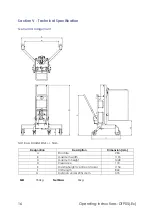
4 Operating Instructions: DTP05(-Ex)
Servicing and repairs
All unit parts and consumables are available from STS. The unit must be fitted with
original STS parts and consumables unless otherwise stated. Any deviation from non-
original parts and consumables may result in injury to personnel or damage to the unit
and will invalidate the warranty. The operator must never disable, remove or adjust
safety mechanisms or switches. The unit should only be serviced and repaired by a
competent individual as selected by the company the equipment is intended for use
with.
Safety devices and warning decals
Safety devices, warning decals and warning instructions in the operating instructions
and on the unit must be strictly observed.
Travel routes and operational areas
Only use lanes and routes specifically designated for unit traffic. Unauthorised third
parties must stay away from operational areas. The unit must only be operated in
operational areas with sufficient lighting to avoid damage or injury to personnel, the unit
or property. Additional equipment is necessary to operate the unit in areas of insufficient
lighting.
Hazardous area of the unit
The hazardous area is defined as the area in which a person is at risk due to the unit itself
or movement of the unit and/or load. This also includes areas which can be reached by
falling loads. The operator must:
•
Instruct unauthorised personnel to leave the hazardous area.
•
Give a warning signal with plenty of time for personnel to leave.
•
Stop all operations if unauthorised personnel are within or enter the hazardous
area.
Travel conduct
The operator must adapt the travel speed to local conditions. The unit must be driven at
slow speed when negotiating bends or narrow passageways, when passing through
swing doors and at blind spots. Abrupt stopping (except in emergencies), rapid U turns
and overtaking at dangerous or blind spots are not permitted. When not in use, the
equipment should be parked in a safe location with the brakes engaged.
Travel visibility
The operator must look in the direction of travel and must always have a clear view of
the route ahead. When transporting loads that affect visibility, a second person must
safely assist the operator to observe the travel route.
Type of loads
The operator must make sure that the load is in a satisfactory condition. Loads must
always be positioned safely and carefully. Use suitable precautions to prevent parts of
the load and/or their contents from falling or spilling.
Cleaning
Cleaning of the unit depends on the environment that the unit is used in. It is
recommended that the unit be cleaned daily if the unit comes into contact with
aggressive substances such as chemicals, fertilizers, salt, etc. It is recommended to use
detergent and a damp cloth to clean the body of the unit. Do not use flammable liquids
to clean the unit. Do not clean the unit with pressurised water. If the unit is rated for ATEX
environments, the unit must be kept clean and dust free.


















